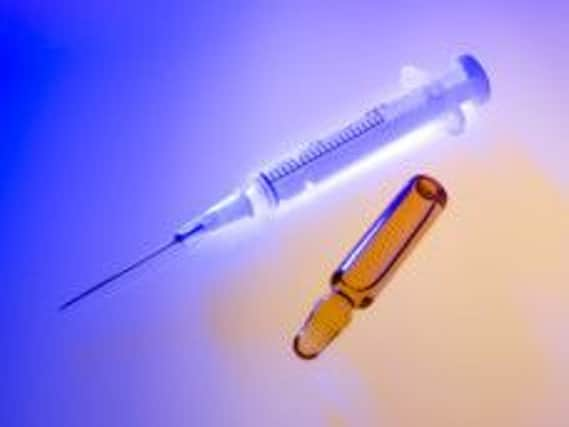New hope as DNA vaccines to fight Ebola proved safe


The findings from the first trial of filovirus vaccines in Africa, published in the Lancet, show they generated a similar immune response in healthy Ugandan adults as reported in healthy American adults earlier this year.
Now it is hoped the vaccines can help to contain outbreaks of the Ebola virus and the closely related Marburg virus.
Advertisement
Hide AdAdvertisement
Hide AdLead author Doctor Julie Ledgerwood, of the National Institutes of Allergy and Infectious Diseases (NIAID) in the US, said: “This is the first study to show comparable safety and immune response of an experimental Ebola vaccine in an African population.
“This is particularly encouraging because those at greatest risk of Ebola live primarily in Africa, and diminished vaccine protection in African populations has been seen for other diseases.”
Scientists from the NIAID developed the DNA vaccines coded for Ebola virus proteins from Zaire and Sudan strains and the Marburg virus protein.
The current Ebola outbreak in West Africa involves the Zaire strain.
The researchers found both DNA vaccines were well tolerated in Ugandan adults.
Currently, no effective vaccines against either virus exist.
CONNECT WITH THE SCOTSMAN
• Subscribe to our daily newsletter (requires registration) and get the latest news, sport and business headlines delivered to your inbox every morning
Dr Ledgerwood added: “These findings have already formed the basis of a more potent vaccine, delivered using a harmless chimpanzee cold virus, which is undergoing trials in the USA, UK, Mali, and Uganda in response to the ongoing Ebola virus outbreak.”
Advertisement
Hide AdAdvertisement
Hide AdDr Saranya Sridhar, of the Jenner Institute at the University of Oxford, said: “This study deserves to be the focal point around which the broader question of vaccine development, particularly for Africa, must be addressed. With the uncharitable benefit of hindsight in view of the evolving 2014 Ebola outbreak, we must ask ourselves whether a filovirus vaccine should have been in more advanced clinical development.
“The international response to the present Ebola outbreak is an example of the speed and purpose with which clinical vaccine development can progress and has set the benchmark against which future vaccine development must be judged.
“This study is the first step on the aspirational road towards the deployment of filovirus vaccines in Africa and must serve to shake the metaphorical cobwebs that can stall our advance towards this destination.”
Outbreaks of Ebola virus and Marburg virus infections have occurred sporadically since they were first detected in 1976 and 1967, respectively, and have a fatality rate as high as 90 per cent and 80 per cent, respectively.
Like the Ebola virus, Marburg is a filovirus that causes internal bleeding at multiple sites with patients usually dying as a result of multiple organ failure.
• Donations from the public have helped a children’s charity raise more than £370,000 to support families caught in the grip of the West Africa Ebola crisis.
The cash, which includes £216,500 raised through Plan UK’s Christmas Appeal, will fund life-saving support as well as ease a looming food shortage.
Tanya Barron, chief executive at Plan UK, said: “The UK public are renowned around the world for their generosity. Once again they have stepped forward to help families less fortunate than themselves.”
SCOTSMAN TABLET AND IPHONE APPS